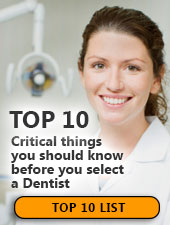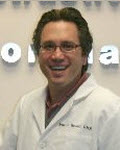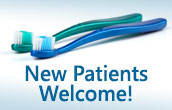The Effects of Aging and Wear on the Mouth
Tooth loss is not part of the normal aging process. In fact, tooth loss is declining among older adults. Aging does not cause oral diseases, yet oral diseases such as tooth loss are more prevalent with age due to changes in the oral soft tissues, a depression of the immune system, an increase in the number of systemic diseases, a decreased ability to perform adequate oral hygiene and self care secondary to stroke, arthritis, Parkinson's disease, dementia, or Alzheimer's disease, and dry mouth due to greater use of prescription and over-the-counter medications.
With age, teeth become less white and more brittle; however, oral hygiene habits and use of tobacco, coffee, and tea also will affect tooth color. Teeth also can darken or yellow due to the thickening of the underlying tooth structure (dentin). Brittle teeth tend to be susceptible to cracks, fractures, and shearing. Over the years, the enamel layer (outer tooth layer) is subjected to wear due to chewing, grinding, and ingestion of acidic foods. In severe cases, the enamel is completely worn away and the underlying dentin is worn down as well. Inside the tooth (pulp), the number of blood vessels and cells decrease and fibroses increase with age; thus, capacity to respond to trauma may also decrease.
The fiber content and number of blood vessels of the periodontal (gum) tissues decrease with age. However, periodontal disease represents a pathologic or disease change and is not due to just age. The loss of bone and gum attachment (receded gums) associated with periodontal disease is collective and therefore greater in older adults. An outcome of periodontal disease is exposed root surfaces. Exposure of the root in older people probably gave rise to the term "long in tooth". Oral hygiene practices and certain medications affect the health of gum tissue. Receded gums and exposed root surfaces put older adults at high risk for dental decay (root caries) on the relatively soft root surfaces. Dental caries on root surfaces is a disease that is common among older adults. Dry mouth and a diet high in sugars and fermentable carbohydrates greatly increase the risk for root caries. Dental caries are a major cause of tooth loss in older adults.
Studies show some reduced chewing effectiveness, decreased tongue strength, and increased swallowing time with age; however, the studies do not indicate that there is any real change in the ability to swallow with age.
The number of cells that produce saliva decrease with age. However, healthy, unmedicated older adults do not have reduced saliva flow. This is because the salivary glands have a high reserve capacity. Usually when a decrease in saliva flow is noted, it is associated with medication use, illness, medical conditions, or their treatment. The number of taste buds do not appear to change with older age; thus, the ability to taste does not change significantly with age. However, smell decreases with age. Since the ability to taste is closely related to smell, taste perception may be altered in older adults.
Soft tissues of the mouth become thinner and lose elasticity with age. Soft tissue lesions are more common in older adults and tooth loss may occur. Chronic inflammation such as candidiasis (fungus growth) and denture irritation also occurs more often. Wound healing is decreased due to reduced vascularity (blood flow to the area) and immune response with age.
Oral and oropharyngeal cancer is the most serious disease associated with age. Oral and oropharyngeal cancer lesions usually are not painful. Oral and pharyngeal cancer may appear as a red or white patch, a sore or ulceration, or a lump or bump that does not heal within two weeks. Swollen lymph nodes of the neck, difficulty swallowing and speaking, and voice changes also may be signs and symptoms of oral and oropharyngeal cancer. The risk for oral and oral pharyngeal cancer increases with age, use of all forms of tobacco, frequent alcohol use, and exposure to sunlight (for lip cancer). See a dentist if any signs or symptoms of oral and pharyngeal cancer are present.
«« Back to Dental Information Center
Need a Second Option?
We're always happy to provide a complimentary "Look See" second opinion/consultation at no cost to you. Call us today for more information.
Military Special!
Get 25% off the regular cost of your initial visit. We're dedicated to making dentistry more affordable for you.





